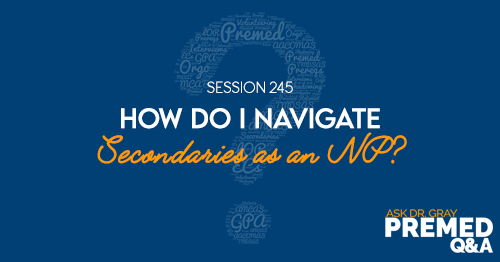Apple Podcasts | Google Podcasts
Session 209
This nontraditional student wants to know if it makes sense to stagger applications. He is an almost 27-year-old nontraditional student who is currently in the process of applying to medical school. With a psychology background, he has almost completed his postbac degree at Seattle University. At this point, his focus is on preparing and submitting secondary applications.
Ask Dr. Gray: Premed Q&A is brought to you by Blueprint MCAT. Listen to this podcast episode with the player above, or keep reading for the highlights and takeaway points.
The episodes in this podcast are recordings of our Facebook Live that we do at 3 pm Eastern on most weekdays. Check out our Facebook page and like the page to be notified. Also, listen to our other podcasts on MedEd Media. If you have any questions, call me at 617-410-6747.
[02:35] Question of the Day
Q: Is it advisable to stagger the submission of medical school applications to different schools based on the secondary essay prompts and their respective deadlines, in order to ensure that the essays are completed before submission? The student’s goal is to apply to about 30 schools since he has 80% of his school list made.
A: It might be a good idea for you to stagger the addition of schools to your application list. Avoid adding all 29 schools at once and potentially being overwhelmed with numerous secondaries. Instead, start with a smaller number of top-choice schools (e.g., five or ten) to ensure a manageable workload.
Once the applications are submitted to the application service, medical schools can send out secondaries regardless of verification status. It is important to consider the ability to complete multiple secondary applications within the given timeframes comfortably.
[05:58] How to Approach Diversity Prompts
The student is asking about how to approach diversity prompts in his medical school applications. He acknowledges that he is a white male with experiences that align with the stereotypical background associated with that demographic (e.g., stable family, middle-class upbringing, university education).
He seeks clarification on how to address diversity prompts and whether he should focus on unique life experiences or perspectives that may differentiate him from other prospective medical school students.
It’s important to move beyond focusing solely on the color of your skin or ethnicity when addressing diversity prompts in your medical school applications. There is nothing inherently unique about any applicant.
Do not get caught up in the idea of being completely unique, instead, be authentic. Reflect on your own life experiences and consider what you can bring to the class in terms of skills, traits, and experiences that may contribute to diversity. Sharing leadership experiences or other relevant qualities that can set you apart while acknowledging that others may also have similar experiences.
[09:12] To Present a Single Experience or a Collection of Experience of Diversity?
The student is concerned about some essays focusing on a single attribute or experience as the sole aspect of diversity. He is asking if it would be more effective to present a collection of different experiences or attributes that they bring to the table, rather than solely focusing on one aspect. Since there is a character limit in essays, it can be restrictive. He hopes he can make it personal by talking about being a psych major, his interest in mental health, his research, and his volunteer work.
Focus on telling your story.
You should focus on telling your story in the most effective and truthful way possible. Stay away from academic and medical examples and experiences in these types of secondary essays. Avoid using your majors as a basis for differentiation, as it can be a common angle for students to take.
Highlight other aspects of your life.
Always remember, classroom experiences are not the same as real-world experiences. It’s important to highlight other aspects of your life, such as athletics or family dynamics, to make your essay more unique and compelling.
Avoid generic stuff.
Be cautious in using generic examples or attempting to showcase how you already act like a doctor, since these are typical approaches that may not make an essay stand out.
“For diversity, specifically, always tie it to how are you going to enhance the educational environment of your peers?”Click To Tweet[15:28] Using the Word Adversity vs. the Word Challenge
The student asks, if the prompt uses the word adversity versus the word challenge, how do you kind of differentiate those two?
There are too many generic essays that do not specifically address the prompt given by the school.
Secondary essay prompts are nuanced and require specific answers tailored to each school’s prompts. There have been instances where students use a general essay and simply copy and paste it without properly addressing the specific nuances of the secondary essay. Hence, make sure to answer each part of the prompt.
[18:08] On the Question of Difficult Life Experiences
The student is addressing the specific type of question that asks about difficult life experiences and how the applicant dealt with and overcame them. He acknowledges that some individuals might find it challenging to come up with a suitable response.
He seeks clarification on how much responsibility he should take for a particular experience and whether it qualifies as something difficult to tap into for the purpose of the essay.
It is perfectly acceptable if you don’t have a dramatic or highly challenging life experience to share. Not everyone will have such stories, and that’s completely fine. You can still effectively convey your unique experiences and perspectives in your essays.
[20:01] How to Discuss the Impact of COVID
The student is seeking clarity on whether he should primarily discuss the impact of COVID-19 on others or if he should focus on his own emotional journey and personal growth as a CNA during the pandemic.
When writing the COVID essay, it is important to focus on the specific aspects of the individual’s life that have been directly affected by the pandemic.
Avoid using medical stories or attempting to portray oneself as exceptionally empathetic or compassionate.
If your experiences during the pandemic have not been dramatic or disruptive, still express gratitude for that and simply state the facts. Whether that’s a shift to online classes or any initial challenges faced, just be truthful and authentic in your response.
Links:
Medical School HQ Facebook page
Medical School HQ YouTube channel
Instagram @MedicalSchoolHQ
Join the Application Academy!
The Premed Playbook: Guide to the Medical School Personal Statement
The Premed Playbook: Guide to the Medical School Application Process
SEARCH SITE
LISTEN FOR FREE












